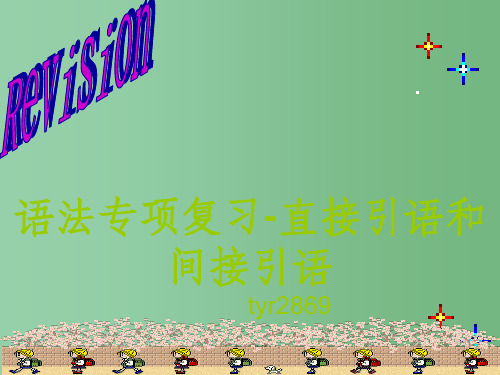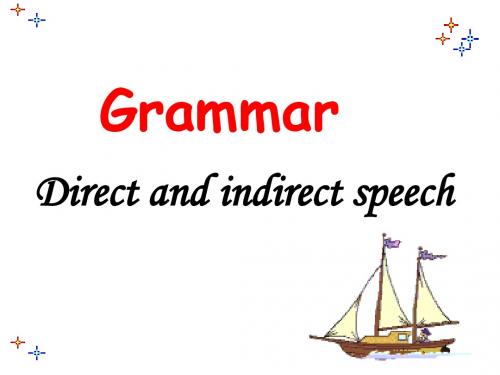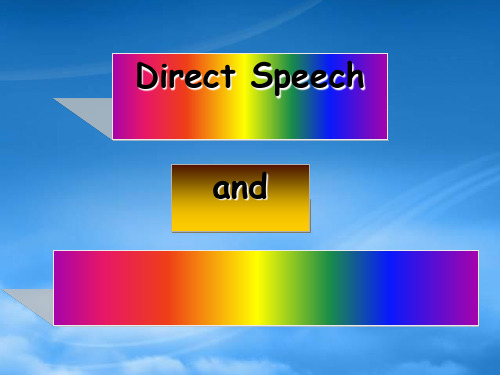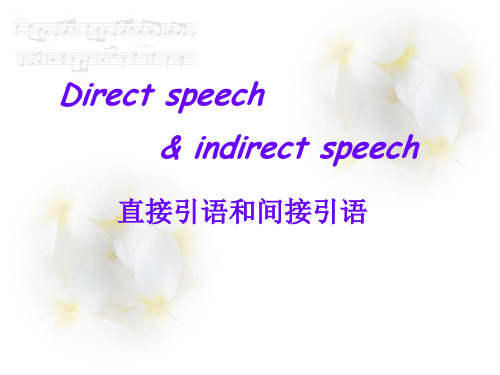新人教版高中英语必修一直接引语和间接引语课件
合集下载
高中英语 第一单元直接引语和间接引语课件 新人教必修1

They said that they had seen her in the street.
过去完成时 不变
He said, “I had finished my homework before supper.”
He said that he had finished his homework before supper.
T: She said that after hiding there for a long time, she had become crazy about nature.
Direct speech
Indirect speech
_______
_____
______
Warming Up
Look at the sentences in Exercise 1 of your Student’s Book on page 5. Work in pairs and identify the difference between direct speech and indirect speech in the sentences.
the day after tomorrow in two days’ time
The captain said, “They will arrive the day after tomorrow.”
The captain said that they would arrive in two days’ time.
The lawyer said that she would go that morning.
these those
He said, “These books are mine.”
过去完成时 不变
He said, “I had finished my homework before supper.”
He said that he had finished his homework before supper.
T: She said that after hiding there for a long time, she had become crazy about nature.
Direct speech
Indirect speech
_______
_____
______
Warming Up
Look at the sentences in Exercise 1 of your Student’s Book on page 5. Work in pairs and identify the difference between direct speech and indirect speech in the sentences.
the day after tomorrow in two days’ time
The captain said, “They will arrive the day after tomorrow.”
The captain said that they would arrive in two days’ time.
The lawyer said that she would go that morning.
these those
He said, “These books are mine.”
人教版高中英语必修一第一单元语法课件(grammar直接引语与间接引语 17张ppt)

eg."What do you call your dairy?" Anne's sister asked her. → Anne's sister asked her what she called her dairy.
Exercise
Ⅰ单项选择 1. He asked _______ for the computer. A. did I pay how much B. I paid how much C. how much did I pay D. how much I paid
2. “Have you seen the film?” he asked me. →He asked me _______. A. had I seen the film B. have I seen the film C. if I have seen the film D. whether I had seen the film
f.一般将来时→过去将来时 eg. Tina said, "He will go to see his friend." →Tina said he would go to see his friend. 注:在以下几种情况下,直接引语变为间接引语时,时态一般不变化: ①直接引语是客观真理 eg. He said, "Light travels much faster than sound." →He said light travels much faster than sound. ②直接引语是一般现在时,表示一种反复出现或习惯性的动作 eg. He said, "I get up at six every morning." →He said he gets up at six every morning. ③直接引语中的情态动词没有过去式(ought to/had better/used to...)或 者已经是过去式(could/should/would/might...) eg. Peter said, "You had better come here today." → Peter said I had better come there that day.
Exercise
Ⅰ单项选择 1. He asked _______ for the computer. A. did I pay how much B. I paid how much C. how much did I pay D. how much I paid
2. “Have you seen the film?” he asked me. →He asked me _______. A. had I seen the film B. have I seen the film C. if I have seen the film D. whether I had seen the film
f.一般将来时→过去将来时 eg. Tina said, "He will go to see his friend." →Tina said he would go to see his friend. 注:在以下几种情况下,直接引语变为间接引语时,时态一般不变化: ①直接引语是客观真理 eg. He said, "Light travels much faster than sound." →He said light travels much faster than sound. ②直接引语是一般现在时,表示一种反复出现或习惯性的动作 eg. He said, "I get up at six every morning." →He said he gets up at six every morning. ③直接引语中的情态动词没有过去式(ought to/had better/used to...)或 者已经是过去式(could/should/would/might...) eg. Peter said, "You had better come here today." → Peter said I had better come there that day.
高中英语 直接引语和间接引语课件 新人教版必修1

• 6. Mother asked me, “Had you finished your homework before you watched TV?”
• Mother asked me whether I had finished my homework before I watched TV.
• He asked the conductor where he would get off to change to a No. 3 bus.
• 5. “Why did she refuse to go there?” the teacher asked.
• The teacher asked why she had refused to go there.
精选课件
精选课件
“I receive a 5-hour training every day.”
Phelps said he received a 5-hour training every day.
精选课件
“I always desire to be the winner, to win gold medals and to break world records.”
精选课件
3.人称的变化
• 直接引语里的“第一一主人称、和二第宾二人、称三,变不间变接”引语
时,人称要做相应调整。例如:
• 直接引语 She said:“ I am hungry。”
• 间接引语 She said she was hungry.
• 直接引语 Mum said to me:“ You can clean your bedroom tomorrow.”
• Mother asked me whether I had finished my homework before I watched TV.
• Mother asked me whether I had finished my homework before I watched TV.
• He asked the conductor where he would get off to change to a No. 3 bus.
• 5. “Why did she refuse to go there?” the teacher asked.
• The teacher asked why she had refused to go there.
精选课件
精选课件
“I receive a 5-hour training every day.”
Phelps said he received a 5-hour training every day.
精选课件
“I always desire to be the winner, to win gold medals and to break world records.”
精选课件
3.人称的变化
• 直接引语里的“第一一主人称、和二第宾二人、称三,变不间变接”引语
时,人称要做相应调整。例如:
• 直接引语 She said:“ I am hungry。”
• 间接引语 She said she was hungry.
• 直接引语 Mum said to me:“ You can clean your bedroom tomorrow.”
• Mother asked me whether I had finished my homework before I watched TV.
高中英语 直接引语和间接引语1课件 新人教版

精选课件
7.“The earth moves around the sun and the moon moves around the earth,” the teacher told me.
The teacher told me the earth ______ the sun and the moon _______ the earth. 答案:moves around; moves around
语法专项复习-直接引语和 间接引语
tyr2869
精选课件
精选课件
精选课件
精选课件
精选课件
精选课件
精选课件
精选课件
将直接引语变为间接引语
1.Dick said to me, “I’m sorry to be late and keep you waiting”.
Dick said to me that_____________________ . 答案:he was sorry to be late and ke
father
asked
hi
son_________________________ .
答案:to remember to give the bird food twice a day
精选课件
5.Mrs Red said to her daughter, “Don’t stay out after ten in the evening.”
there
精选课件
3.The woman asked Emily, “How do you get thinner like this?”
The
woman
asked
________________________.
7.“The earth moves around the sun and the moon moves around the earth,” the teacher told me.
The teacher told me the earth ______ the sun and the moon _______ the earth. 答案:moves around; moves around
语法专项复习-直接引语和 间接引语
tyr2869
精选课件
精选课件
精选课件
精选课件
精选课件
精选课件
精选课件
精选课件
将直接引语变为间接引语
1.Dick said to me, “I’m sorry to be late and keep you waiting”.
Dick said to me that_____________________ . 答案:he was sorry to be late and ke
father
asked
hi
son_________________________ .
答案:to remember to give the bird food twice a day
精选课件
5.Mrs Red said to her daughter, “Don’t stay out after ten in the evening.”
there
精选课件
3.The woman asked Emily, “How do you get thinner like this?”
The
woman
asked
________________________.
高中英语直接引语和间接引语课件新人教版.ppt

→He said where there is a will, there is a way.
Pair work
• One of you will be a child and the other the grandmother. The grandmother is listening to a weather report with her grandchild. Try to use indirect speech in your dialogue.
the day before
the night before then
before
that day
the next day
in two days’ time
指示代词 this
that
these
those
Please change the
sentences from direct
speech into indirect speech
He asked me if I wanted to go by train or by plane. ⒎ He said to me, “I will see her next week.” →
He told me that he would see her the next week. ⒏ He said, “Where there is a will, there is a way.”
疑问句的语序 人称
第一人称 第二人称
第三人称
第三人称
第一人称或第三 人称 第三人称
时态
一般现在时 一般过去时
一般将来时 现在进行时 现在完成时 过去完成时
一般过去时 过去完成时
Pair work
• One of you will be a child and the other the grandmother. The grandmother is listening to a weather report with her grandchild. Try to use indirect speech in your dialogue.
the day before
the night before then
before
that day
the next day
in two days’ time
指示代词 this
that
these
those
Please change the
sentences from direct
speech into indirect speech
He asked me if I wanted to go by train or by plane. ⒎ He said to me, “I will see her next week.” →
He told me that he would see her the next week. ⒏ He said, “Where there is a will, there is a way.”
疑问句的语序 人称
第一人称 第二人称
第三人称
第三人称
第一人称或第三 人称 第三人称
时态
一般现在时 一般过去时
一般将来时 现在进行时 现在完成时 过去完成时
一般过去时 过去完成时
新人教版高中英语必修一直接引语和间接引语课件

“ Do you know Rick had been ill in bed for many days till he died?” Jack asked. 过去完成时 无间接宾语 → Jack asked me if I knew Rick had been ill in bed for 过去完成时 many days till he died. 加间接宾语 me He asked, “ How far is it from here to your home?” → He asked how far it was from there to my home.
14
6. 直接引语为反意疑问句
变成whether或 if引导的宾语从句。 “You’ve already got well, haven’t you? ” she asked. → She asked whether I had already got well(康复).
15
直接引语变为间接引语,下列情况时态不变 1.直接引语主句动词为一般现在时,一般将来时或现 在完成时,变为间接引语,从句时态不变. She often says, “All men and women are equal under the 主句 law.” 从句: “ ” 部分 → She often says that all men and women are equal under the law. 2.直接引语的“ ”部分有具体的过去时间状语:过去 某年,某月,某日时,变为间接引语,时态不变. Xiao Wang said. “I was born on April 2l, 1980.” → Xiao Wang said he was born on April 20, 1980. 16
14
6. 直接引语为反意疑问句
变成whether或 if引导的宾语从句。 “You’ve already got well, haven’t you? ” she asked. → She asked whether I had already got well(康复).
15
直接引语变为间接引语,下列情况时态不变 1.直接引语主句动词为一般现在时,一般将来时或现 在完成时,变为间接引语,从句时态不变. She often says, “All men and women are equal under the 主句 law.” 从句: “ ” 部分 → She often says that all men and women are equal under the law. 2.直接引语的“ ”部分有具体的过去时间状语:过去 某年,某月,某日时,变为间接引语,时态不变. Xiao Wang said. “I was born on April 2l, 1980.” → Xiao Wang said he was born on April 20, 1980. 16
人教版高中英语必修一Unit1Friendship直接引语和间接引语课件(共33张PPT)

现在完成时→过去完成时
Paul said,“our team has won the match” 改为 Paul said their team had won the match.
过去完成式→过去完成时
He said,“I had finished my homework before supper.” 改为 He said that he had finished his homework before supper.
“ I’ll come to help you wherever you need my help”,he answered her. 换成 He answered her that he would come to help her wherever she needed his help.
She said to me,“your pronunciation is better than his”. 换成
四、指示代词、时间状Байду номын сангаас、 地点状语和动词的变化
1.指示代词
this 改为that She said,“she is coming this week” She said that she was coming that week.
these改为those He said,“these books are mine.” He said those books were his.
3、变为特殊疑问句由who,what,when等 疑问词引导的宾语从句。
He said,“where is Mr Wang?” 换成 He asked where Mr Wang was.
三、时态变化
主句的谓语动词一般过去时, 从句的谓语动词在时态方面作出相 应的变化,总体是向前推一个时态。
高中英语unit1语法--直接引语和间接引语课件新人教版必修一

The geography teacher said, “The sun rises in the east and sets in the west.”
The geography teacher told us that the sun rises in the east and sets in the west.
A. who is he B. who he is C. who is it D. who it is
3. Can you tell me ____? A. how good is his spoken English B. how well his spoken English is C. how well he speaks English
A. where do you come C. where you will come B. where you come D. there you come
7. Ask her ____ come with us.
A. if she will C. that if she will B. if or not she will D. whether will she
10. John ___ me he was going to help me with my English.
Homework:
1. Review the reading:
The Merchant of Venice(1)
The Merchant of Venice(2)
2. Find the sentences you like in the texts.
5. Did you say_____?
A. that what he said was true B. that it was true that he said C. what did he say was true D. what he said it was true
高一英语直接引语和间接引语课件 人教

“Take off your boots,” he said.
“I don’t know where your bike is,” said the Arab.
“I’m sorry,” the professor said to the class, “but none of you watched carefully enough.”
She asked me if/whether I would go there with her.
She asked, “Did you see the film yesterday, Peter?”
She asked Peter if/whether he had seen the film the day before.
Direct Speech:
用自己的话转述别人所说的内容。通常 以宾语从句的形式出现。当直接引语变 为间接引语时,有关的人称、语序、时 态、代词、时间状语、地点状语、和少 数动词都要作相应的改变。
Indirect Speech:
时 态 的 变 化
直接引语
间接引语
一般现在时
现在进行时
现在完成时
一般过去时
The teacher said in class, “The moon moves around the earth.”
The teacher said in class that the moon moves around the earth.
陈述句 直接引语变间接引语的结构:
特殊ห้องสมุดไป่ตู้问句:
变为间接引语后,仍用原来的疑问词引 导,用陈述语序。时态等作相应变化。
‘’When did they build this bridge?” she asked.
“I don’t know where your bike is,” said the Arab.
“I’m sorry,” the professor said to the class, “but none of you watched carefully enough.”
She asked me if/whether I would go there with her.
She asked, “Did you see the film yesterday, Peter?”
She asked Peter if/whether he had seen the film the day before.
Direct Speech:
用自己的话转述别人所说的内容。通常 以宾语从句的形式出现。当直接引语变 为间接引语时,有关的人称、语序、时 态、代词、时间状语、地点状语、和少 数动词都要作相应的改变。
Indirect Speech:
时 态 的 变 化
直接引语
间接引语
一般现在时
现在进行时
现在完成时
一般过去时
The teacher said in class, “The moon moves around the earth.”
The teacher said in class that the moon moves around the earth.
陈述句 直接引语变间接引语的结构:
特殊ห้องสมุดไป่ตู้问句:
变为间接引语后,仍用原来的疑问词引 导,用陈述语序。时态等作相应变化。
‘’When did they build this bridge?” she asked.
高一英语UNit1直接引语和间接引语课件人教课标必修1

4. Her father asked her why she had chosen her diary and old letters. 5. “Are you very hot with so many clothes on?” Mother asked/said to her. 6. “What else have you hidden under your overcoat?” Margot asked her. 7. “ When shall we go back home?” Anne asked her father. 8. “ Why did you talk so much to that boy?” Father asked Anne.
Goodbye!
9、静夜四无邻,荒居旧业贫。。*** 10、雨中黄叶树,灯下白头人。。**** 11、以我独沈久,愧君相见频。。***** 12、故人江海别,几度隔山川。。**** 13、乍见翻疑梦,相悲各问年。。***** 14、他乡生白发,旧国见青山。。**** 15、比不了得就不比,得不到的就不要。。。***** 16、行动出成果,工作出财富。。*** 17、做前,能够环视四周;做时,你只能或者最好沿着以脚为起点的射线向前。。**** 9、没有失败,只有暂时停止成功!。*** 10、很多事情努力了未必有结果,但是不努力却什么改变也没有。。**** 11、成功就是日复一日那一点点小小努力的积累。。***** 12、世间成事,不求其绝对圆满,留一份不足,可得无限完美。。**** 13、不知香积寺,数里入云峰。。***** 14、意志坚强的人能把世界放在手中像泥块一样任意揉捏。**** 15、楚塞三湘接,荆门九派通。。。***** 16、少年十五二十时,步行夺得胡马骑。。*** 17、空山新雨后,天气晚来秋。。**** 9、杨柳散和风,青山澹吾虑。。*** 10、阅读一切好书如同和过去最杰出的人谈话。**** 11、越是没有本领的就越加自命不凡。***** 12、越是无能的人,越喜欢挑剔别人的错儿。**** 13、知人者智,自知者明。胜人者有力,自胜者强。***** 14、意志坚强的人能把世界放在手中像泥块一样任意揉捏。**** 15、最具挑战性的挑战莫过于提升自我。。***** 16、业余生活要有意义,不要越轨。*** 17、一个人即使已登上顶峰,也仍要自强不息。****
Goodbye!
9、静夜四无邻,荒居旧业贫。。*** 10、雨中黄叶树,灯下白头人。。**** 11、以我独沈久,愧君相见频。。***** 12、故人江海别,几度隔山川。。**** 13、乍见翻疑梦,相悲各问年。。***** 14、他乡生白发,旧国见青山。。**** 15、比不了得就不比,得不到的就不要。。。***** 16、行动出成果,工作出财富。。*** 17、做前,能够环视四周;做时,你只能或者最好沿着以脚为起点的射线向前。。**** 9、没有失败,只有暂时停止成功!。*** 10、很多事情努力了未必有结果,但是不努力却什么改变也没有。。**** 11、成功就是日复一日那一点点小小努力的积累。。***** 12、世间成事,不求其绝对圆满,留一份不足,可得无限完美。。**** 13、不知香积寺,数里入云峰。。***** 14、意志坚强的人能把世界放在手中像泥块一样任意揉捏。**** 15、楚塞三湘接,荆门九派通。。。***** 16、少年十五二十时,步行夺得胡马骑。。*** 17、空山新雨后,天气晚来秋。。**** 9、杨柳散和风,青山澹吾虑。。*** 10、阅读一切好书如同和过去最杰出的人谈话。**** 11、越是没有本领的就越加自命不凡。***** 12、越是无能的人,越喜欢挑剔别人的错儿。**** 13、知人者智,自知者明。胜人者有力,自胜者强。***** 14、意志坚强的人能把世界放在手中像泥块一样任意揉捏。**** 15、最具挑战性的挑战莫过于提升自我。。***** 16、业余生活要有意义,不要越轨。*** 17、一个人即使已登上顶峰,也仍要自强不息。****
高中英语 U1语法直接引语和间接引语课件 新人教必修1

He asked me
“What do you think of the film?” She asked her friend.
She asked her friend
which room
I
lived in
what
she
thought of
the film
.பைடு நூலகம்
.
3.直接引语是选择疑问句,变间接引语时, 引导词: whether/if …or 语序:陈述句语序 句尾标点:随主句标点
4. Where are you going for vacation, Tony? I asked Tony 5. Do you remember his birthday? She asked 6. “What can I do for you?” he asked me. He asked me 7. “Are you interested in English?” he said. He asked
He told us,“I want this blue one.”
He told us ____________________________.
She said to me, “You can’t do anything now.”
She told me ____________________________.
I was/am
his
was
1. Mary asked, “Could you help me cook dinner?” Mary asked me 2. He asked, “Why are you so late for school, Jimmy?” He asked Jimmy 3. Will you tell me the answer to this question? She asked
“What do you think of the film?” She asked her friend.
She asked her friend
which room
I
lived in
what
she
thought of
the film
.பைடு நூலகம்
.
3.直接引语是选择疑问句,变间接引语时, 引导词: whether/if …or 语序:陈述句语序 句尾标点:随主句标点
4. Where are you going for vacation, Tony? I asked Tony 5. Do you remember his birthday? She asked 6. “What can I do for you?” he asked me. He asked me 7. “Are you interested in English?” he said. He asked
He told us,“I want this blue one.”
He told us ____________________________.
She said to me, “You can’t do anything now.”
She told me ____________________________.
I was/am
his
was
1. Mary asked, “Could you help me cook dinner?” Mary asked me 2. He asked, “Why are you so late for school, Jimmy?” He asked Jimmy 3. Will you tell me the answer to this question? She asked
人教版高中英语必修一:Unit 1 Friendship-Grammar直接引语间接引语 课件 (共26张PPT)

Mr. Wang said he was born in China in September,1972.
She said,“They had left when I arrived there. ” She said they had left when she arrived there.
He told me that he had left his book in my room.
一随主,二随宾,第三人称不变
直接引语中的状语
间接引语中的状语
状 语 变 化
now ago
then before/earlier that day that morning/week…… the day before the morning before the next day/the following day the week/ month before…
Yesterday XiaoJing said that that he he would would go to No.3 middle school the the next next day day.
Discovery
like English?” 1. She asked me ,“do you like I liked liked English. She aksed me if I you like?” 2.Tom asked me ,“what subjet do you I liked. Tom asked me what subjet I this 3. He said,“I’m going to see a film this afternoon。” He said that he was going to see a that afternoon. 每组第二个都是间接引语 film that
She said,“They had left when I arrived there. ” She said they had left when she arrived there.
He told me that he had left his book in my room.
一随主,二随宾,第三人称不变
直接引语中的状语
间接引语中的状语
状 语 变 化
now ago
then before/earlier that day that morning/week…… the day before the morning before the next day/the following day the week/ month before…
Yesterday XiaoJing said that that he he would would go to No.3 middle school the the next next day day.
Discovery
like English?” 1. She asked me ,“do you like I liked liked English. She aksed me if I you like?” 2.Tom asked me ,“what subjet do you I liked. Tom asked me what subjet I this 3. He said,“I’m going to see a film this afternoon。” He said that he was going to see a that afternoon. 每组第二个都是间接引语 film that
人教版英语高中必修一第一单元语法直接引语和间接引语课件

▪
B. was I a Party member or a League member
C. if I was a Party member or a League member
▪
D. whether was I a Party member or a League member.
z
Practice
必修一Unit 1 Friendship
Grammar
z Direct speech &indirect speech
z
Definition 定义
▪ 直接引语 Direct speech ▪ 直接引述别人的原话,把说的话放在引号内 ▪ 间接引语 Indirect speech ▪ 用自己的话转述别人的话。多数情况下构成宾语从句。
z
时态不变的情况
▪ 直接引语中还有情态动词must, need, had better及情态动词的过 去式could, might, should, would等
▪ He said, “ I could swim when I was only six. “
▪ > He said that he could swim when he was only six.
z
句式变换
Transformation
z
指示代词
变化形式 this>that
例句
She said, “I am coming this week.” > She said that she was coming that week.
these>those
He said, “These books are mine.” > He said that those books were his
高中英语必修一unit1 Grammar 精品课件 人教版直接引语和间接引语 (共16张)

→The teacher said to me the earth around the sun earth. moves
四、如何变句型(引导词的运用): ①直接引语如果是陈述句式…said/told that…
that
She said, "Our bus will arrive in five minutes.“ →She said that their bus would arrive in five minutes. ②直接引语如果是疑问句,间接引语应改为由 或 引导的宾语从句. whether 、 if swim, John?“ He said, "Can you →He asked John he could swim. whether "Do you go to school by bus or by bike?" →He asked me I went to school by bus or by bike. if
直接引语变间接引语, 主句为过去时 时,从句时态要发生如下变化: 一般现在时 现在完成时 现在进行时 一般将来时 一般过去时 一般过去时 过去完成时 过去进行时 过去将来时 过去完成时
注意:时态 不变
①直接引语是客观真理,经常用一般现在时。
The teacher said "The earth moves around the sun .”
直接引语转换间接引语时句式结构变化
1.直接引语是陈述句(用that 引导,口语 中可省略)
2.直接引语是一般疑问句(用if/whether引 导,陈述句语序)
3.直接构成一个宾语从句
1. He said, “I live in Xiamen.” → He said 【that he lived in Xiamen】.宾语从句 2.She said, “Are you interested in chemistry?” →She asked 【if /whether I was interested in chemistry】.宾语从句 3.He asked me,“What are these?” →He asked me 【what those were】.宾语从句 4.Betty asked me “Where are you from?” 【where I was from】.宾语从句 →Betty asked me
四、如何变句型(引导词的运用): ①直接引语如果是陈述句式…said/told that…
that
She said, "Our bus will arrive in five minutes.“ →She said that their bus would arrive in five minutes. ②直接引语如果是疑问句,间接引语应改为由 或 引导的宾语从句. whether 、 if swim, John?“ He said, "Can you →He asked John he could swim. whether "Do you go to school by bus or by bike?" →He asked me I went to school by bus or by bike. if
直接引语变间接引语, 主句为过去时 时,从句时态要发生如下变化: 一般现在时 现在完成时 现在进行时 一般将来时 一般过去时 一般过去时 过去完成时 过去进行时 过去将来时 过去完成时
注意:时态 不变
①直接引语是客观真理,经常用一般现在时。
The teacher said "The earth moves around the sun .”
直接引语转换间接引语时句式结构变化
1.直接引语是陈述句(用that 引导,口语 中可省略)
2.直接引语是一般疑问句(用if/whether引 导,陈述句语序)
3.直接构成一个宾语从句
1. He said, “I live in Xiamen.” → He said 【that he lived in Xiamen】.宾语从句 2.She said, “Are you interested in chemistry?” →She asked 【if /whether I was interested in chemistry】.宾语从句 3.He asked me,“What are these?” →He asked me 【what those were】.宾语从句 4.Betty asked me “Where are you from?” 【where I was from】.宾语从句 →Betty asked me
高一英语直接引语和间接引语课件新课标人教版ppt

间接引语(变化后 间接引语 变化后) 变化后 不定式
The officer said to The officer ordered him, “Don’t leave him not to leave his your post.” post.
He said , “Don’t make so much noise, boys.”
直接引语(变化前 直接引语 变化前) 变化前 引导动词为: 引导动词为 主句 动词 为一 般过 去时 过去完成时 “ Do you know Rick had been ill in bed for many days till he died?” Jack asked.
间接引语(变化后 间接引语 变化后) 变化后 从句动词变为: 从句动词变为 从句 动词 时态 相应 变化 过去完成时 Jack asked if I knew Rick had been iБайду номын сангаасl in bed for many days till he died.
由直接引语转变为间接引语,下列情况 由直接引语转变为间接引语 下列情况 时态不变: 时态不变 1. 客观不变的真理 The teacher said to the students, “Water freezes when the temperature falls below 0℃.” ℃ → The teacher told the students that water freezes when the temperature falls below 0℃. ℃
Direct speech & indirect speech
直接引语和间接引语
变化前) 直接引语 (变化前 变化前 陈述句 Jane said, “I’m very fond of traveling.”
- 1、下载文档前请自行甄别文档内容的完整性,平台不提供额外的编辑、内容补充、找答案等附加服务。
- 2、"仅部分预览"的文档,不可在线预览部分如存在完整性等问题,可反馈申请退款(可完整预览的文档不适用该条件!)。
- 3、如文档侵犯您的权益,请联系客服反馈,我们会尽快为您处理(人工客服工作时间:9:00-18:30)。
“ Do you know Rick had been ill in bed for many days till he died?” Jack asked. 过去完成时 无间接宾语 → Jack asked me if I knew Rick had been ill in bed for 过去完成时 many days till he died. 加间接宾语 me He asked, “ How far is it from here to your home?” → He asked how far it was from there to my home.
7
宾语 me
加间接宾语 me
时间变化 直接引语 now today tonight this week/month/year/ morning/afternoon/evening yesterday last night week/month/year the day before yesterday four days/months/years ago tomorrow next week/month/year the day after tomorrow 间接引语 then that day that night that week/month/year/ morning/afternoon/evening the day before the night/week/month/yrar before two days before before= earlier four days/months/years before the next day next=following the next week/month/year 8 two days later/ in two days’ time
二随宾
无间 接宾语
He said, “I’ll give you an examination next Monday.” → He told us that he would give us an examination the next
Monday. “Who is here?” he asked.
若直接引语中没有间接宾语,变为间接引语时可加一 个间接宾语,如 me,him,her,theu,you,us 等.但用told间接引语 主句的谓语动词时必修加间接宾语,句型: S told sb. 从句.
代词指向
He said, “I’ve left my book in my room.”
无间接宾语 宾语 me
二随宾
1.She said to me, “I broke your CD player.”
→She told me that she had broken my CD player.
2.He said to her, “I broke your CD player.”
→He told her that he had broken her CD player.
→ He ordered the boys not to make so much noise.
直接引语如果是以“Let’s”开头的祈使句,变为间接引语 时,通常用 “suggest doing sth./that we should do sth.” 应该 I said to him, “Let’s start at once.” → I suggested to him that we should start at once. I suggested starting at once. “Don’t leave the door open after midnight,” said Mother. 13 → Mother told me not to leave the door open after midnight.
间接引语
She said that she liked tennis. He told Lily that she must get up early.
引号内的第三人称 She said to me , She told me that 在变间引后人称不 “ They want to they wanted to 5 help him.” help him. 变
直接引语 间 接 引 语
1
直接引语:直接引述别人的话,前要加引号. 间接引语:用自己的话转述别人的话,不用引号. 在多数情况下构成宾语从句. 例.John said, “I like reading story books.” 直接引语 John said that he liked reading story books。间接引语 直接引语变为间接引语 1.直接引语为陈述句 变为间接引语时, 连接词用that, 在口语中可省略. 引述 动词用said, told等. 句型: S---V---that从句. 注意:可以说 said that从句, said to sb. that从句, told sb. 2 that从句, 但不可说told that从句.
He said to the boy,“ Come here, young man! ” →He asked the boy to go there.
方向动词变化
12
方向动词变化 come → go
bring → take
He said , “Don’t make so much noise, boys.”
→ She asked Tom if /whether he could help her.
6
代词指向,二随宾 “Is this room yours or his?” → He asked me whether this room was mine or his. He said to me , “I am learning English now.” 间接宾语 me → He said to me that he was learning English then.
3
时态变化 直接引语 一般现在时 一般将来时 现在进行时 一般过去时 现在完成时 过去完成时
间接引语 一般过去时 过去将来时 过去进行时 过去完成时 过去完成时 过去完成时
现在将来变过去, 过去变过去完成, 过去完成不变.
4
人称变化
使间接引语中的人称与直接引语中的人称指向一致.
口诀 说明 直接引语 一 引号内的第一人称 She said,“ I like 随 变间引后与主句主 Tennis.” 主 语的人称保持一致 二 引号内的第二人称 He said to Lily, 随 变间引后与主句宾 “ you must get 宾 语的人称保持一致 up early.” 三 不 变
10
these → those
二随宾
He asked,“How are you gettingalong?”
无间接宾语 加间接宾语 us
→ He asked us how we were getting along.
He said, “We shall start tomorrow.”
→ He said they would start the next day.
三不变
11
4.直接引语为祈使句 变为间接引语时,将祈使句的动词原形变为带to的不定 式。据语气不同引述动词有tell, ask, order, beg, advise 等, 句型:tell/ask/order /beg / advise sb.(not/never)to do sth. “Make sure the door is shut,” she said to her little son. → She told her little son to make sure the door was shut. “Don’t cry any more,” he said to his little brother. → He asked his little brother not to cry any more.
5.直接引语为感叹句 变为由 that/ what/ how 引导的宾语从句 He said, “How happy I am!” → He said that he was very happy.
He said how happy he was.
He said, “What a fine day it is!” → He said what a fine day it was. He exclaimed that it was a fine day. He said, “How fine the day is!” → He said how fine the day was.
→ He told me that he had left his book in his room. 加间接 He said to us, “I have been to the Great Wall. ”
→ He said to us that he had been to the Great Wall.
2. 直接引语为一般疑问句 变为间接引语时, 连接词用if或whether, 而引述选择疑问 句时只能用whether, 疑问语序变为陈述语序, 引述动词用 asked, 句型: S---V---if/ whether从句. 一随主 She said to Tom, “Can you help me?”
→ He asked who was there. 地点状语变化 here → there
ห้องสมุดไป่ตู้
加间接宾语 us
二随宾 无间接宾语 加间接宾语 me
9 不加间接宾语me也可
He asked, “Which school are you in?” → He asked me which school I was in. He asked which school I was in.
7
宾语 me
加间接宾语 me
时间变化 直接引语 now today tonight this week/month/year/ morning/afternoon/evening yesterday last night week/month/year the day before yesterday four days/months/years ago tomorrow next week/month/year the day after tomorrow 间接引语 then that day that night that week/month/year/ morning/afternoon/evening the day before the night/week/month/yrar before two days before before= earlier four days/months/years before the next day next=following the next week/month/year 8 two days later/ in two days’ time
二随宾
无间 接宾语
He said, “I’ll give you an examination next Monday.” → He told us that he would give us an examination the next
Monday. “Who is here?” he asked.
若直接引语中没有间接宾语,变为间接引语时可加一 个间接宾语,如 me,him,her,theu,you,us 等.但用told间接引语 主句的谓语动词时必修加间接宾语,句型: S told sb. 从句.
代词指向
He said, “I’ve left my book in my room.”
无间接宾语 宾语 me
二随宾
1.She said to me, “I broke your CD player.”
→She told me that she had broken my CD player.
2.He said to her, “I broke your CD player.”
→He told her that he had broken her CD player.
→ He ordered the boys not to make so much noise.
直接引语如果是以“Let’s”开头的祈使句,变为间接引语 时,通常用 “suggest doing sth./that we should do sth.” 应该 I said to him, “Let’s start at once.” → I suggested to him that we should start at once. I suggested starting at once. “Don’t leave the door open after midnight,” said Mother. 13 → Mother told me not to leave the door open after midnight.
间接引语
She said that she liked tennis. He told Lily that she must get up early.
引号内的第三人称 She said to me , She told me that 在变间引后人称不 “ They want to they wanted to 5 help him.” help him. 变
直接引语 间 接 引 语
1
直接引语:直接引述别人的话,前要加引号. 间接引语:用自己的话转述别人的话,不用引号. 在多数情况下构成宾语从句. 例.John said, “I like reading story books.” 直接引语 John said that he liked reading story books。间接引语 直接引语变为间接引语 1.直接引语为陈述句 变为间接引语时, 连接词用that, 在口语中可省略. 引述 动词用said, told等. 句型: S---V---that从句. 注意:可以说 said that从句, said to sb. that从句, told sb. 2 that从句, 但不可说told that从句.
He said to the boy,“ Come here, young man! ” →He asked the boy to go there.
方向动词变化
12
方向动词变化 come → go
bring → take
He said , “Don’t make so much noise, boys.”
→ She asked Tom if /whether he could help her.
6
代词指向,二随宾 “Is this room yours or his?” → He asked me whether this room was mine or his. He said to me , “I am learning English now.” 间接宾语 me → He said to me that he was learning English then.
3
时态变化 直接引语 一般现在时 一般将来时 现在进行时 一般过去时 现在完成时 过去完成时
间接引语 一般过去时 过去将来时 过去进行时 过去完成时 过去完成时 过去完成时
现在将来变过去, 过去变过去完成, 过去完成不变.
4
人称变化
使间接引语中的人称与直接引语中的人称指向一致.
口诀 说明 直接引语 一 引号内的第一人称 She said,“ I like 随 变间引后与主句主 Tennis.” 主 语的人称保持一致 二 引号内的第二人称 He said to Lily, 随 变间引后与主句宾 “ you must get 宾 语的人称保持一致 up early.” 三 不 变
10
these → those
二随宾
He asked,“How are you gettingalong?”
无间接宾语 加间接宾语 us
→ He asked us how we were getting along.
He said, “We shall start tomorrow.”
→ He said they would start the next day.
三不变
11
4.直接引语为祈使句 变为间接引语时,将祈使句的动词原形变为带to的不定 式。据语气不同引述动词有tell, ask, order, beg, advise 等, 句型:tell/ask/order /beg / advise sb.(not/never)to do sth. “Make sure the door is shut,” she said to her little son. → She told her little son to make sure the door was shut. “Don’t cry any more,” he said to his little brother. → He asked his little brother not to cry any more.
5.直接引语为感叹句 变为由 that/ what/ how 引导的宾语从句 He said, “How happy I am!” → He said that he was very happy.
He said how happy he was.
He said, “What a fine day it is!” → He said what a fine day it was. He exclaimed that it was a fine day. He said, “How fine the day is!” → He said how fine the day was.
→ He told me that he had left his book in his room. 加间接 He said to us, “I have been to the Great Wall. ”
→ He said to us that he had been to the Great Wall.
2. 直接引语为一般疑问句 变为间接引语时, 连接词用if或whether, 而引述选择疑问 句时只能用whether, 疑问语序变为陈述语序, 引述动词用 asked, 句型: S---V---if/ whether从句. 一随主 She said to Tom, “Can you help me?”
→ He asked who was there. 地点状语变化 here → there
ห้องสมุดไป่ตู้
加间接宾语 us
二随宾 无间接宾语 加间接宾语 me
9 不加间接宾语me也可
He asked, “Which school are you in?” → He asked me which school I was in. He asked which school I was in.
